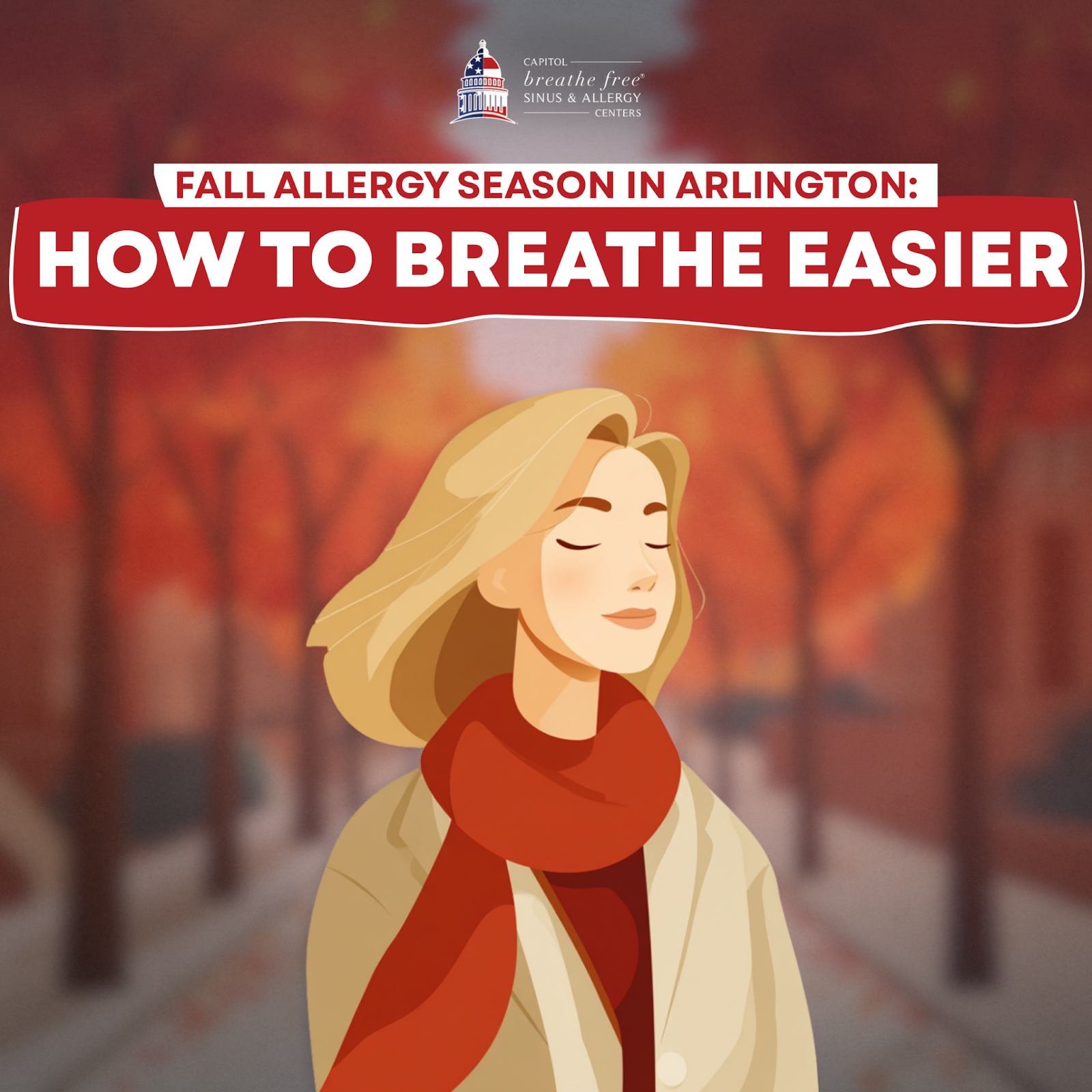Fall Allergy Season in Arlington: How to Breathe Easier
Virginia is home to a mix of forests and different climates, allowing a diverse plant life to thrive. While the state’s natural beauty is captivating, it can also mean bad news for allergy sufferers. An ideal environment for plants to grow also means pollination for allergy sufferers.
While Virginia, like the rest of the country, has fairly cold winters and offers a break from seasonal allergies during the colder months, pollen season still generally runs from late February to November, with different allergens with varying peak times.
It’s never easy to deal with allergies. The frequent sneezing, runny nose, scratchy throat, and itchy and watery eyes can be frustrating and impact productivity and the quality of your life. And understanding when your allergies might be worst in Arlington and the surrounding communities is key to better managing them.

Fall Allergies: Arlington Residents Must Know
Due to Virginia’s diverse plant life and different climates, tree, grass, and weed pollen are common throughout the year. The fall season doesn’t just mark the beginning of cozy pumpkin spice in the air–it also marks the beginning of weed allergy season. Allergy sufferers tend to be affected by ragweed, thistle, and goldenrod. Weed pollen season can also extend until the first frost, depending on the weather conditions.
The fall season can significantly increase the amount of mold growth due to the rotting leaves. The cool and damp conditions make for an ideal environment for mold, and they can release mold spores into the air, potentially triggering symptoms.
Common allergy symptoms to look out for include:
- Frequent and uncontrollable sneezing
- Runny nose
- Stuffy nose
- Thin, watery, and clear mucus discharge
- Itchy and watery eyes
- Scratchy throat
- Coughing
- Headaches
- Skin hives and rashes
Breathe Easier: Effective Management and Treatment Strategies
Don’t keep suffering–try these easy hacks and strategies to effectively manage your symptoms, despite Virginia’s nightmare-ish fall allergy season:
✅Monitor daily pollen counts.
Make it a habit to start your day by checking daily allergen and pollen counts. Staying on top of the numbers is key to proper allergy management.
✅Avoid going out during peak allergen times.
Time your outdoor activities smartly and go out only when pollen counts are lower and safer. Pollen counts are usually high in the mornings, so avoid going out during this time.
✅Wear protective clothing.
If you’re heading out, minimize your exposure to allergens by wearing dust masks, hats, or scarves.
✅Wash away the allergens.
Once you get home, immediately take off your outdoor clothes and get in the shower to wash away pollen and allergens stuck on your skin and hair.
✅Keep your home clean.
Regularly dust and vacuum your home to minimize the presence of allergens. Change and wash bedding, sheets, and pillowcases regularly. Additionally, trim trees, mow the lawn, and remove weeds to reduce pollen around your home.
✅Close doors and windows.
This keeps pollen and allergens out of your home, especially on windy and high pollen count days.
✅Keep pets clean.
Groom them more frequently, keep them off beds and furniture, and clean them up before letting them back inside.
✅Try over-the-counter medications.
Decongestants, antitussives, nasal sprays, and pain relievers can provide quick and temporary relief from symptoms.
✅Get allergy testing.
Getting tested for your allergies is the best way to gain a better understanding of your unique allergy profile. This way, your care provider can create a personalized treatment plan that works for you.
✅If all else fails, try immunotherapy.
Sublingual immunotherapy is an off-label treatment option in the U.S. that may help reduce sensitivity to allergens over time. Many patients report symptom improvements, though results vary.. If home remedies, lifestyle modifications, and medications don’t work, your care provider might suggest this. What it does is desensitize the body so you’re less reactive to your allergy triggers.
Breathe Easier With Capitol Breathe Free
It’s never easy to deal with allergies, especially if your symptoms grow stronger and your frustrations grow bigger. If you’re looking to manage the common ragweed allergy during this fall season transition, our team at Capitol Breathe Free provides evaluation and care for patients in Arlington and the surrounding communities.
If fall allergies are disrupting your daily life, schedule a consultation with us, and explore evaluation and treatment options that may help improve your symptoms
The information provided in this article is for informational and educational purposes only and does not constitute medical advice. It is not intended to diagnose, treat, cure, or prevent any disease or medical condition. Always seek the guidance of your physician or other qualified healthcare provider with any questions you may have regarding a medical condition or treatment.
Results may vary: Treatment outcomes and health experiences may differ based on individual medical history, condition severity, and response to care.
Emergency Notice: If you are experiencing a medical emergency, call 911 or seek immediate medical attention.

.png)
.png)